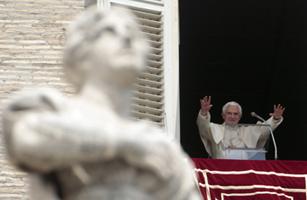By Stephan Faris
The Time
September 20, 2011
http://www.time.com/time/world/article/0,8599,2093771,00.html
 |
| Pope Benedict XVI greets the crowd attending the Regina Coeli prayer in St. Peter's Square on May 15, 2011 |
When a group of victims of pedophile priests announced on Sept. 13 that they would ask the International Criminal Court (ICC) to try the Pope on charges of crimes against humanity, the Vatican was quick to dismiss the petition as a "ludicrous publicity stunt." After all, prosecutors would have to prove that Pope Benedict XVI, in allegedly neglecting to address pervasive sex abuse in the Catholic Church, belongs in the company of Serbia's Slobodan Milosevic, Liberia's Charles Taylor and the perpetrators of the Rwandan genocide.
And yet, while few experts give the case much of a chance of success — or even believe it will make it before the judge — the fact that it's even up for discussion is testament to the success that victims groups have had in bringing their cause against the church before the law. "This is a further escalation of cases that have been going on for some time," says Jo-Renee Formicola, a professor of political science at New Jersey's Seton Hall University, who studies the Vatican's legal travails. "If [the ICC] decides to hear this case, it sets a new bar. And even if it doesn't, it's an important move forward in raising awareness. If the church is put in a position where it has to defend itself, in the court of law or the court of public opinion, it's going to be quite significant."
(See pictures of Pope Benedict XVI.)
Since the earliest high-profile cases in the U.S. in the 1980s, when individual victims began trying to hold their abusers to account, the movement has coalesced into organized groups. Priests have been brought before judges in criminal and civil cases in the U.S., Ireland, Australia, Canada, Belgium and elsewhere. In the U.S. alone, the Catholic Church has paid out billions of dollars in compensation to those abused by priests, and at least eight U.S. dioceses have been forced into bankruptcy, most recently the Archdiocese of Milwaukee, which filed for protection last January in anticipation of pending lawsuits.
As the legal successes have piled up, victims groups and their lawyers have worked their way up the hierarchy, turning their attention from the priests who committed the abuse to bishops they accuse of covering for them, then up the Vatican hierarchy they allege put in place a system that enabled their abusers, and finally to the Pope himself. "It's really a top-down problem," says Jeff Anderson, a lawyer who in 27 years has filed more than 1,000 sex-abuse cases against the Catholic Church. "It's the protocol and practices being set at the highest level, at the papacy. All evidentiary trails lead to Rome." In 2010, Anderson won a major victory when the U.S. Supreme Court gave the green light to a case that seeks to hold the Vatican financially responsible for the abuse carried out by pedophile priests. In effect, the court rejected the Holy See's claim to immunity as a foreign state. The case, which had initially been seen as a publicity stunt, is now in discovery.
(See the top 10 Vatican pop-culture moments.)
The petition presented to the ICC, for which Anderson has provided supporting documentation, is another attempt to hold top officials at the Vatican responsible for what they claim is a coordinated effort to protect priests at the expense of their victims. The odds against the petition are high. "In a nutshell, the legal chances of success are quite limited," says Carsten Stahn, chair of international criminal law and global justice at Leiden University's the Hague campus. The petitioners will first have to convince the prosecutor that the case can't better be handled by domestic authorities. They will then have to show that the court has jurisdiction and that the alleged cover-up qualifies as a crime against humanity — especially difficult, says Stahn, because lack of action would only qualify if it were "consciously aimed at encouraging such attack."
And yet, says David Clohessy, national director of the Survivors Network of those Abused by Priests, the group that filed the petition, the court provides a unique opportunity to seek justice for victims not just in the U.S. or other Western countries, but also all over the world. "We're not naive," says Clohessy. "We don't think the Pope will be hauled off in handcuffs next week or next month. But by the same token, our long-term chances are excellent. We've been around 23 years, and we can't count the number of times when church officials or church observers have said to us, What you're asking won't and can't ever be done. Ultimately, we believe that victims, witnesses and whistle-blowers across the planet will continue to come forward, and at some point the evidence and political courage will cause the ICC to act. "
Any original material on these pages is copyright © BishopAccountability.org 2004. Reproduce freely with attribution.